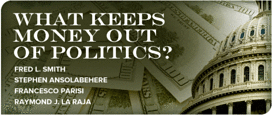Editorial Note
Lead Essay
Fred L. Smith Jr. argues that while public choice economics can be a powerful tool, it has focused far too much on failure rather than success — markets fail; governments intervene; governments fail in their turn. We are told again and again that there is too much money in politics, and yet, if we quantify the returns to be had from lobbying, we discover that businessmen have actually been holding back. This suggests a previously underappreciated virtue on their part.
Response Essays
Stephen Ansolabehere recommends a shift in focus, away from normative claims and toward using money in politics as a tool for understanding the distribution of political power. He shares several of the more important findings from research in this direction and downplays the return on lobbying investment, characterizing it as “modest, at best.”
Raymond J. La Raja argues that American political institutions work against would-be buyers of special favors. The party system, the structure of our Constitution, and the difficulty of crafting a national media campaign all mitigate against rent-seeking behavior. That said, the lucky few still manage to earn outsized returns, even while many lobbyists go away with nothing. La Raja is skeptical that businessmen can work the political system toward better governance, and he doubts that the Public Choice school would make an apt partner in the effort.
Francesco Parisi argues that markets for political goods are highly inefficient and seldom work like traditional ones. Unexpectedly low levels of political advocacy effort do not reflect a hidden virtue on the part of would-be rent seekers. On the contrary, they indicate that simply that hidden additional costs exist in this area of effort, and that the rents to be sought are not as cheap as they may appear.
Related at Cato
- Event – Campaign Finance after Citizens United: What Happened? What Now?
- Interview – John Samples discusses Super PACs, Citizens United and the role of corporate money in politics on CCTV’s The Heat
- Cato Unbound – “Following the Money: The Law and Ethics of Campaign Finance Disclosure,” November 2010

